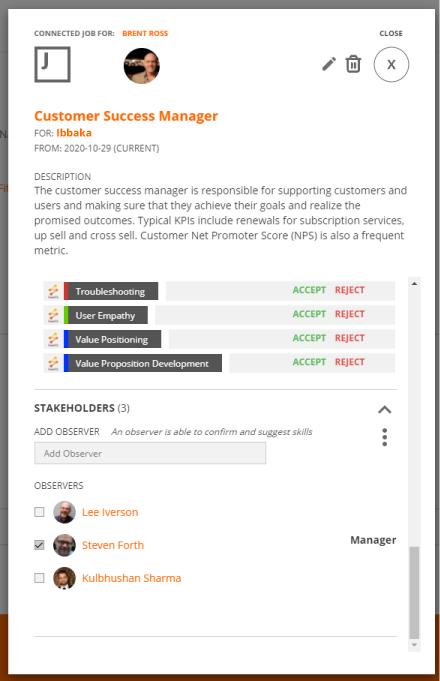Assessing Skills as Part of Continuous Performance Management
Brent Ross is Customer Success Manager at Ibbaka. See his skill profile here.
Traditional performance management methods require managers to assess employee performance on a set of criteria based on job descriptions. This approach is quickly fading into oblivion. Instead, organizations are opting for more nimble, continuous assessment of employee contribution and growth, based on outcomes such as KPIs, OKRs, for example. When implemented well, this new approach will, in addition to outcomes, put a firm focus on employee development.
At the same time, many organizations struggle to find long-term value in competency models, especially for performance management. Sadly competency models have existed largely as a kind of checklist to make sure someone is meeting a baseline rather than pointing the way towards the skills individuals and the organization need to maintain differentiation and growth. They have also often failed to represent the diversity of their talent pool or their true potential. Such competency models have also not been flexible enough to model the skills of a future workforce.
At Ibbaka, we’ve taken a different approach to competency models, putting an emphasis on roles and related skills rather than jobs, and by putting skills at the heart of these models. This allows us more flexibility to ensure that models change as work is changing, as well as to make the model more useful to the people doing the work.
As we roll out new functionality enabling organizations to conduct skill assessments based on skill-centric competency models, we wanted to explain why we did it and how organizations can generate value for their employees and decision makers from layering in skill-based assessment in their overall performance management efforts.
The new role-based skill assessment functionality on Ibbaka Talent enables continuous skills assessment, or joint assessment with the manager at a specific point in time.
Why competency models are often not fit for the purpose of assessment…
Let's get this out of the way. We believe that competency models as they’ve been designed until now have not been flexible enough to frame discussions about performance. There are several reasons for this:
The design goals for any competency models are often focused on organizing jobs or to support creation of learning initiatives.
These design goals tend to dilute a collective understanding of the real 'real work' that is getting done, on the ground. For example, two people might have the same job title in a job architecture around engineering, but could be working on very different things (software engineers working in entirely different domains could have the same title).
Many organizations, but especially large ones, struggle to apply such models uniformly across the organization and often they cannot get alignment on how to do so. This problem is compounded when multi-nationals try to roll out models across different cultures.
You can go deeper on how we approach competency model design by reading this blog article by Ibbaka Managing Partner, Steven Forth. In the meantime, let’s look briefly at the design characteristics necessary in competency models that can give us a dynamic and up-to-date view of skills in our organisations.
Build competency models to support meaningful insight
To remain relevant in the future, competency models need to accomplish three key things:
Act as a lens into how skills are being used in different roles and on projects
Give individuals a way to understand how their current skill set lines up with their current responsibilities, as well as those to which they aspire
Help individuals organize the next steps in their professional growth
Once you have a competency model that is designed to adapt, and it is connected to individual skill profiles, it becomes possible to answer a number of key business questions such as:
Do we have the skill to create the value we want to deliver?
Will we have the skills we need to meet tomorrow’s goals?
Are there hidden pockets of potential we can deploy?
What learning and development investments do we need to be making for the near-term, and the long-term.
To answer this and other questions about skills, you also need a steady stream of current, objective data that can be trusted, power insight, and enable strategic decision making.
The question is, how to get that data? We believe that success lies in part, in building trust for all the aspects of continuous and dynamic assessment:
Create a process that people can trust, then enable continuous, skill-centric assessment on an understandable scale
Foster trust in the data. Include the manager point of view in your assessment process, but go beyond it
Assess skills for the right reason, and use the data accordingly
Create a process people can trust, then enable skill-centric peer assessment
The best organisational cultures in the world thrive on trust. Communication, respect, fairness and transparency are all key ingredients in the equation. These organisations achieve high levels of trust in part by fostering mechanisms that empower peers to give each other feedback, often beginning with peer-powered recognition programs.
The emergence of software platforms to track feedback around OKRs and KPIs are creating an opportunity to take this type of trust one step further. However, these platforms still do not provide a good mechanism for understanding how skills factor into the picture.
Ibbaka Talent accomplishes this in part by giving managers and individuals the ability to request that specific people assess them, thereby controlling who contributes to their assessment where role- or job-related, must-have skills are concerned. Giving control to managers and their direct reports is a good first step to creating trust. But we also enable this in the context of teams, where individuals can add the skills they are using in the team, and their teammates can accept or decline an invitation to provide a confidential assessment of those skills.
Foster trust in the data, go beyond the manager’s point of view
Research continues to prove that neither managers nor their direct reports are reliable enough at assessing the skills of any given employee. Marcus Buckingham and others who are focused on individual and team effectiveness regularly denounce the value of any one data point when it comes to understanding individual performance. That said, we also know that someone who has a skill, and who is highly regarded by others as competent or even as an expert, is likely to be more reliable in their assessments than someone who doesn’t use the skill in day-to-day work. This of course, assumes the person doing the assessment has also had the opportunity to observe the individual being assessed. When this is true, individuals and leaders alike are far more likely to trust the data.
When Skill Profiles are connected to a role, multiple people can be invited to assess skills.
Ibbaka Talent has had the ability for some time now to aggregate confidential skill assessment in a kind of weighted average we call SkillRank. The SkillRank algorithm is always being dynamically adjusted, and it gives more weight to the assessment of those who are highly regarded in a skill and who have used a skill recently. Now we can do this in conjunction with pre-defined skill sets from a competency model.
Assess skills for the right reasons, and use the data accordingly
Studies on the use of 360 assessment data have shown that leaders are more likely to succeed at using this feedback towards noticeable improvements in performance if the data is only provided for their benefit, as opposed to providing it to HR for the purposes of making decisions around salary or promotions.
This is true for skill assessment data and our enterprise customers are reinforcing this. They go to great lengths to ensure that their employees know their data is being used to generate insights for the organisation on aggregate, but that their individual data is intended only to help them grow. That being said, we also believe that the insights that matter are those that should accrue to the individuals as they gain perspective on their abilities, but also through discovering learning pathways associated with those skills.
The bottom line is that using competency models to power any kind of assessment goes well beyond the design of the model itself. If you’d like to know more about incorporating skills into your performance management framework, or processes for continuous assessment, please reach out to us at info@ibbaka.com.




